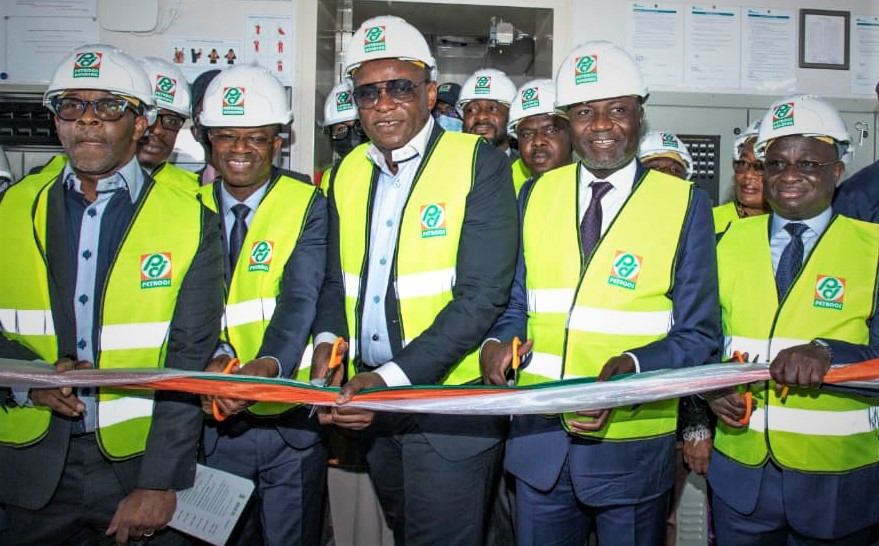The Ivorian National shores welcomed a whiff of clean energy as SAPET GAS, the pioneer Liquefied Petroleum Gas (LPG) vessel to be named under Ivorian origin and carry the national flag, made its historic maiden voyage to Cote D’Ivoire.
Commissioned last May in Ulsan, South Korea, the 23,000 cubic meter capacity vessel which cost CFA 26 billion was received by Excellence Mamadou Sangafowa Coulibaly, Minister of Energy, Vamissa Bamba, Director General, Petroci, Temitope Shonubi, Executive Director, Sahara Group, Wale Ajibade, Executive Director, Sahara Group, Soro Tiotioho, Director General, Societe, Ivoirienne de Raffinage (SIR), Kam SIE, Chairman SAPET Energy, Olayemi Odutola, Managing Director, SAPET Energy, and Mayor of the Municipality of Port-Bouët, Dr. Sylvestre Emmou, among others.
SAPET GAS will enhance butane supply, availability, efficiency and distribution in Cote D’Ivoire to spur economic development and safeguard the well-being of over 28 million Ivorians, being a clean fuel. It will also help facilitate access to the commodity for over 50 million people in neighbouring countries.
Energy Minister, Sangafowa Coulibaly said the government had subsidised butane gas across the nation to increase accessibility, reduce and ultimately eliminate the use of firewood by households. “This policy has made it possible to significantly increase the national consumption of butane gas, which has thus increased from 150,000 MT in 2012 to 510,000 MT in 2021; That is an average growth of 14% per year. I salute the PETROCI/SAHARA partnership, and in particular, the Sahara Group for investing in the acquisition of this vessel dedicated exclusively to importation of butane gas into our country,” he said.
According to Temitope Shonubi, Executive Director, Sahara Group, facilitating investment in gas infrastructure and supply reinforces the company’s commitment to driving energy transition in Africa. “We are privileged and delighted to work with the government and good people of Cote D’Ivoire to make clean energy accessible to all Ivorians. For Sahara, SAPET GAS is an affirmation of our commitment to Cote D’Ivoire. We made a promise and we have delivered”, he said.
Bamba, the Petroci DG, commended Sahara Group for working assiduously and harmoniously with all stakeholders since the energy conglomerate began operations in Cote D’Ivoire. He said the partnership, SAPET ENERGY, commenced in October 07, 2020 when the first stone for the construction of three butane spheres with a total capacity of 12,000 Tons was laid to enhance the butanisation policy.
“This storage infrastructure will increase existing storage capacities and can take us from 15 to 30 days of self-consumption. SAPET GAS will guarantee the supply of butane gas to our country under good conditions of safety and quality,” he added.
The Mayor of the Municipality of Port-Bouët, Dr. Sylvestre EMMOU said the Port would play its strategic role of ensuring the maritime industry contributes its quota to promoting access to energy solutions in Cote D’Ivoire.
“This storage infrastructure will increase existing storage capacities and can take us from 15 to 30 days of self-consumption. SAPET GAS will guarantee the supply of butane gas to our country under good conditions of safety and quality,” he added.
Named after the joint venture between Sahara and Petroci (National Oil Company), SAPET GAS will be instrumental to realising the supply of about 1,000,000 tonnes of LPG to Cote D’Ivoire over the next three years. This will be alongside other vessels, Africa Gas, Sahara Gas and Barumk which are affiiated with energy and infrastructure conglomerate, Sahara Group.
Sahara Group’s partnership with Petroci continues to increase access to gas as a cleaner fuel option with over CFA 279 billion invested since 2014. SAPET’s 12KT LPG storage facility project remains on course. The facility upon completion will promote supply, distribution and access to cleaner fuels in Cote D’Ivoire, Mali, Burkina Faso and Guinea, among others.
Investments in gas vessels are on the rise globally with a total of 28 new medium and handy gas carriers expected over the next two years with 18 percent of them focusing on Sub-Saharan Africa.
The growth in LPG market is driven by the following factors: low per capital consumption with scope for growth; population growth and urbanization, and potential to substitute kerosene/ biomass in domestic sector as well as move towards cleaner fuels.









